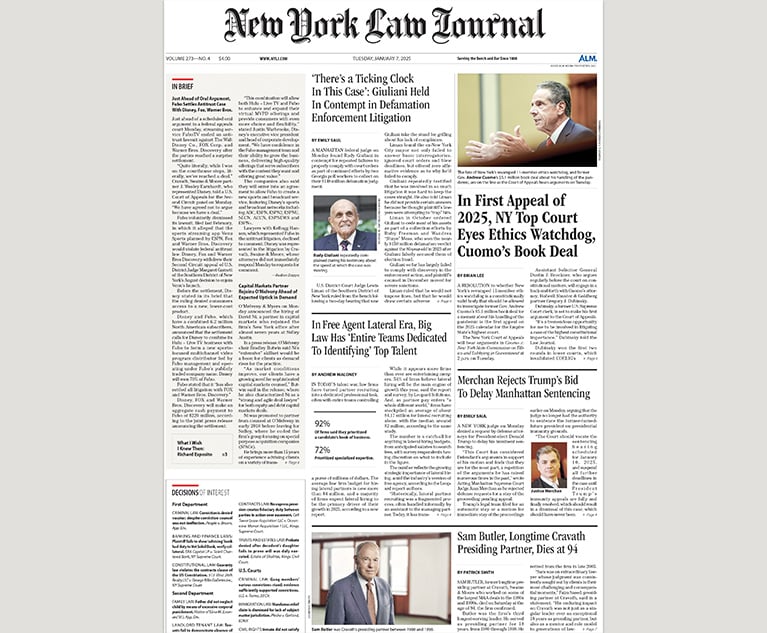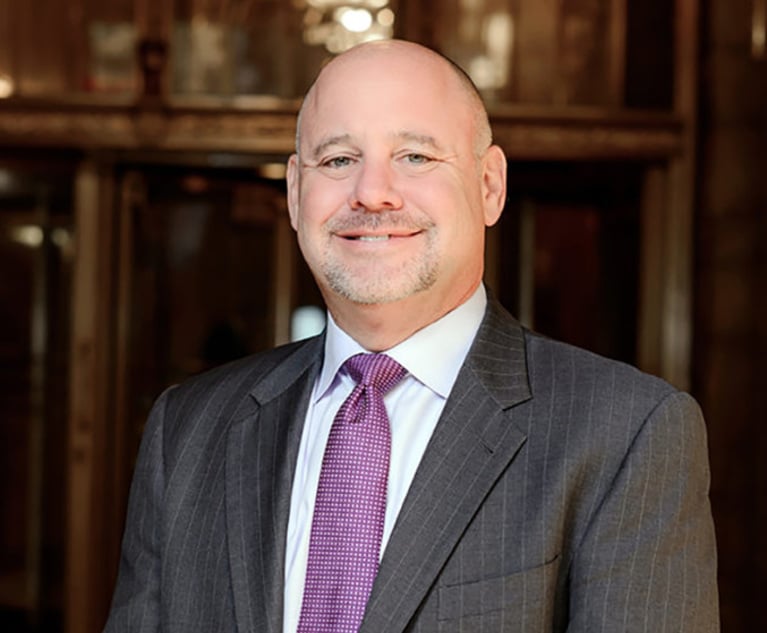 (Photo: shutterstock.com)
(Photo: shutterstock.com)O'Melveny Lawyers Ponder Their Future After Failed Merger Talks
Some observers believed the contrast between A&O's lockstep pay arrangement and O'Melveny's merit-based compensation system were too much of a hurdle to overcome.
September 04, 2019 at 09:54 AM
6 minute read
The original version of this story was published on The American Lawyer
The breakup of merger talks between O'Melveny & Myers and Magic Circle firm Allen & Overy came as a surprise to some partners of the U.S. firm who were confident in the last several weeks that the merger would occur, sources said.
The New York Law Journal affiliate Legal Week reported Monday that the two firms had finally called an end to their talks almost 18 months after they became public.
In light of the scuttled deal, multiple sources said they expect some O'Melveny lawyers will leave the firm. That's because some lawyers at the Los Angeles-founded firm were encouraged to stay on through the merger, while others had anticipated more business as a result of the combination.
Now those incentives are gone, and confidence in management is shaken. "I strongly suspect there are a number of people who are dispirited," one of the sources said.
Legal market observers confirmed that it's natural, after any protracted merger talks, to see some level of attrition by lawyers disappointed with the result.
O'Melveny management notified lawyers about the failed talks through a voicemail message shortly before the firm issued a public statement, according to a source who was briefed about the message.
The announcement came as surprise for some of O'Melveny's most senior lawyers, highlighting how the merger discussions were opaque to the partnership through the end, some sources said. Some lawyers even turned away business due to potential conflicts under a combined firm.
Some important partners inside the firm, within the last month or so, were "pretty confident that it was going forward," said one source, and partners appeared to be taking the merger "as a matter of course."
In a statement to ALM on Tuesday, an O'Melveny spokesman said the "negotiations concluded on Friday and by the following day (Saturday) every attorney and staff member was notified."
The spokesman added that, throughout the merger talks, partners received regular updates "through many town halls, video conferences, office meetings and voicemails," as well as at other partner meetings. O'Melveny also created a webpage with merger-related documentation for partners so they could review information and raise questions or concerns, the spokesman said.
One legal industry observer believed the failed merger discussions meant O'Melveny was more likely to merge in some form or capacity with another firm, even though the firm is healthy on its own. O'Melveny saw record increases in profits per equity partner and net income in 2018, with both figures growing at over 12 percent.
"The firm will be OK," said one source, but "they can't be very happy" about the merger result.
Law firm management consultant J. Mark Santiago noted O'Melveny & Myers just invested significant time and resources into an unsuccessful merger, and, as a result, the firm probably won't want to do any other deal immediately.
"And they shouldn't," Santiago said. "They should embark on a reflection period of what do we want, what went wrong and how do we move forward so this doesn't happen."
The O'Melveny spokesman declined to comment on firm strategy and said he would not speculate about the possibility of lateral departures.
|Skeptical Response
The New York Law Journal affiliate Legal Week reported that people at both firms stressed that the main reason for the breakdown in discussions was the current adverse macroeconomic conditions, including a reduction in U.S. interest rates and foreign exchange rate volatility.
But just as in the U.K., observers of the talks in the U.S. were skeptical those were the main challenges to the merger, because the same market issues have existed for months, and the firms knew about Brexit challenges when the merger talks were first reported.
Larry Watanabe, a San Diego-based recruiter at Watanabe Nason who places partners and practices groups in Am Law 200 firms, said "there has to be more behind" the breakup.
"While the current foreign exchange issues are causing a fair amount of tension due to unnecessary trade war escalation, the markets have been fluctuating for some time and are not materially more significant now than they were a year ago," Watanabe said.
Some observers believed the contrast between A&O's lockstep pay arrangement and O'Melveny's merit-based compensation system were too much of a hurdle to overcome.
Compensation differences—between lockstep in the U.K. and merit-based pay systems in the U.S.—can seriously complicate merger talks. In past trans-Atlantic law firm talks, some firms have decided to integrate their pay systems, such as Hogan Lovells, and others did not, such as Womble Bond Dickinson, ALM previously reported.
Law firm management consultant Kent Zimmermann said in trans-Atlantic mergers he and his colleagues have advised on, it often makes sense to have a period of transition during which the approaches to compensation, capital, governance and other elements "are feathered together."
"We usually have a good sense of what the major issues are [including challenges] early in the discussions," said Zimmermann, of the Zeughauser Group.
Still, he added, "growth is hard, whether it's substantial lateral growth or mergers, domestic mergers or trans-Atlantic mergers of size," Zimmermann said. "If they were so easy, a lot more firms would have already done them."
The failure of Allen & Overy and O'Melveny & Myers to consummate a deal may not be isolated to those firms. It could have a ripple effect throughout the industry.
Zimmermann said for those firms that are already in trans-Atlantic merger talks and have identified the value of the deal, he sees those discussions continuing.
But for others, including a number of U.S. firms that have considered a trans-Atlantic merger, they are in a "wait-and-see posture," pending the outcome of Brexit and the uncertainty over a recession, he said.
For those firms that haven't started discussions, this may add to their hesitancy to start any, he said. "It will cause them to say, 'wow, those guys couldn't get it done. Could we get it done?'" Zimmermann said. "This may give them some pause."
This content has been archived. It is available through our partners, LexisNexis® and Bloomberg Law.
To view this content, please continue to their sites.
Not a Lexis Subscriber?
Subscribe Now
Not a Bloomberg Law Subscriber?
Subscribe Now
NOT FOR REPRINT
© 2025 ALM Global, LLC, All Rights Reserved. Request academic re-use from www.copyright.com. All other uses, submit a request to [email protected]. For more information visit Asset & Logo Licensing.
You Might Like
View All
DLA Piper NY Office Adds Ex-Verizon GC As Big Law Goes on In-House Hiring Spree

Trending Stories
- 1Courts, Lawyers Press On With Business as SoCal Wildfires Rage
- 2Florida, a Political Epicenter, Is the Site of Brownstein Hyatt's 13th Office
- 3Law Firms Close Southern California Offices Amid Devastating Wildfires
- 4Lawsuit alleges racial and gender discrimination led to an Air Force contractor's death at California airfield
- 5Holland & Knight Picks Up 8 Private Wealth Lawyers in Los Angeles
Who Got The Work
Michael G. Bongiorno, Andrew Scott Dulberg and Elizabeth E. Driscoll from Wilmer Cutler Pickering Hale and Dorr have stepped in to represent Symbotic Inc., an A.I.-enabled technology platform that focuses on increasing supply chain efficiency, and other defendants in a pending shareholder derivative lawsuit. The case, filed Oct. 2 in Massachusetts District Court by the Brown Law Firm on behalf of Stephen Austen, accuses certain officers and directors of misleading investors in regard to Symbotic's potential for margin growth by failing to disclose that the company was not equipped to timely deploy its systems or manage expenses through project delays. The case, assigned to U.S. District Judge Nathaniel M. Gorton, is 1:24-cv-12522, Austen v. Cohen et al.
Who Got The Work
Edmund Polubinski and Marie Killmond of Davis Polk & Wardwell have entered appearances for data platform software development company MongoDB and other defendants in a pending shareholder derivative lawsuit. The action, filed Oct. 7 in New York Southern District Court by the Brown Law Firm, accuses the company's directors and/or officers of falsely expressing confidence in the company’s restructuring of its sales incentive plan and downplaying the severity of decreases in its upfront commitments. The case is 1:24-cv-07594, Roy v. Ittycheria et al.
Who Got The Work
Amy O. Bruchs and Kurt F. Ellison of Michael Best & Friedrich have entered appearances for Epic Systems Corp. in a pending employment discrimination lawsuit. The suit was filed Sept. 7 in Wisconsin Western District Court by Levine Eisberner LLC and Siri & Glimstad on behalf of a project manager who claims that he was wrongfully terminated after applying for a religious exemption to the defendant's COVID-19 vaccine mandate. The case, assigned to U.S. Magistrate Judge Anita Marie Boor, is 3:24-cv-00630, Secker, Nathan v. Epic Systems Corporation.
Who Got The Work
David X. Sullivan, Thomas J. Finn and Gregory A. Hall from McCarter & English have entered appearances for Sunrun Installation Services in a pending civil rights lawsuit. The complaint was filed Sept. 4 in Connecticut District Court by attorney Robert M. Berke on behalf of former employee George Edward Steins, who was arrested and charged with employing an unregistered home improvement salesperson. The complaint alleges that had Sunrun informed the Connecticut Department of Consumer Protection that the plaintiff's employment had ended in 2017 and that he no longer held Sunrun's home improvement contractor license, he would not have been hit with charges, which were dismissed in May 2024. The case, assigned to U.S. District Judge Jeffrey A. Meyer, is 3:24-cv-01423, Steins v. Sunrun, Inc. et al.
Who Got The Work
Greenberg Traurig shareholder Joshua L. Raskin has entered an appearance for boohoo.com UK Ltd. in a pending patent infringement lawsuit. The suit, filed Sept. 3 in Texas Eastern District Court by Rozier Hardt McDonough on behalf of Alto Dynamics, asserts five patents related to an online shopping platform. The case, assigned to U.S. District Judge Rodney Gilstrap, is 2:24-cv-00719, Alto Dynamics, LLC v. boohoo.com UK Limited.
Featured Firms
Law Offices of Gary Martin Hays & Associates, P.C.
(470) 294-1674
Law Offices of Mark E. Salomone
(857) 444-6468
Smith & Hassler
(713) 739-1250








